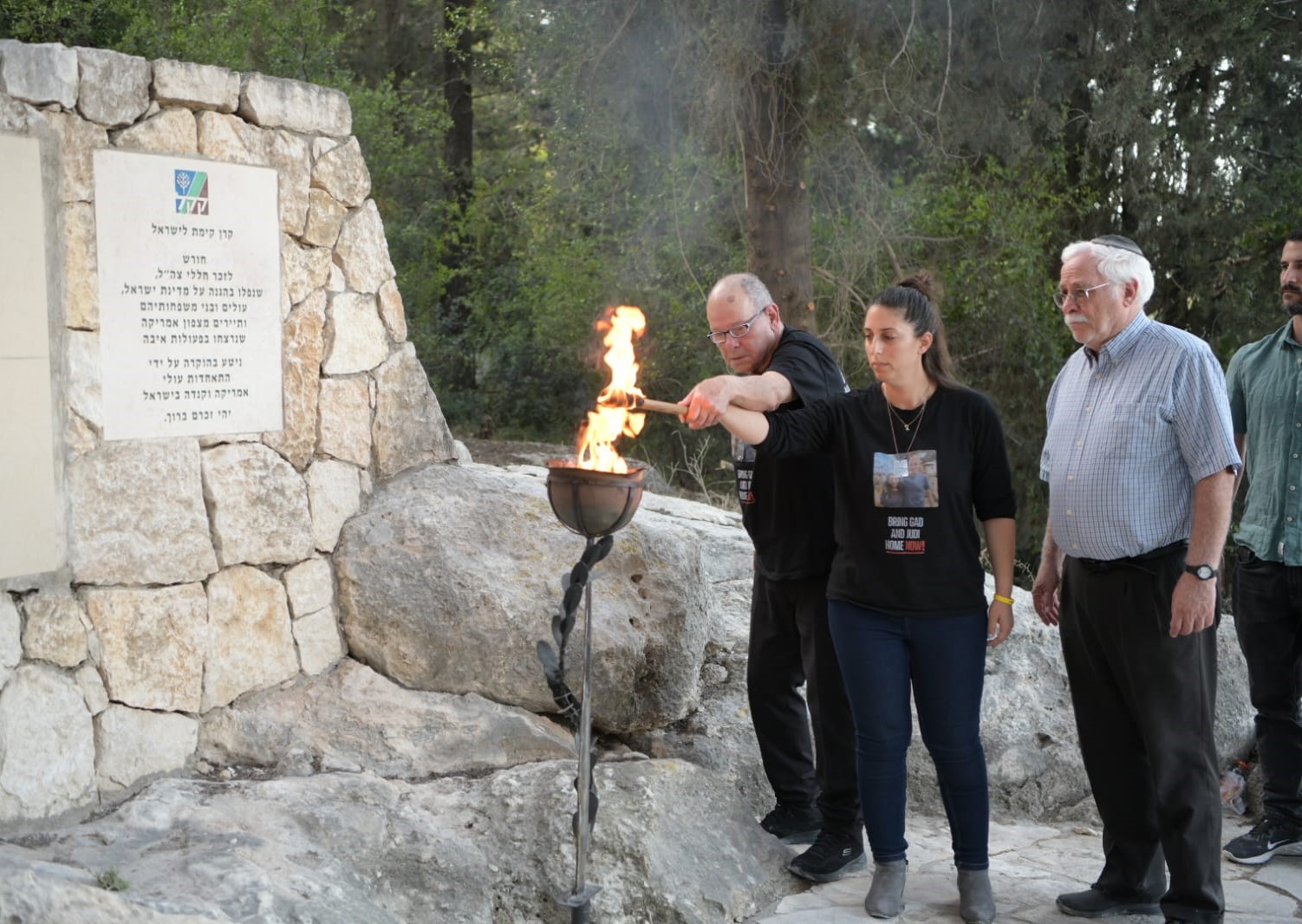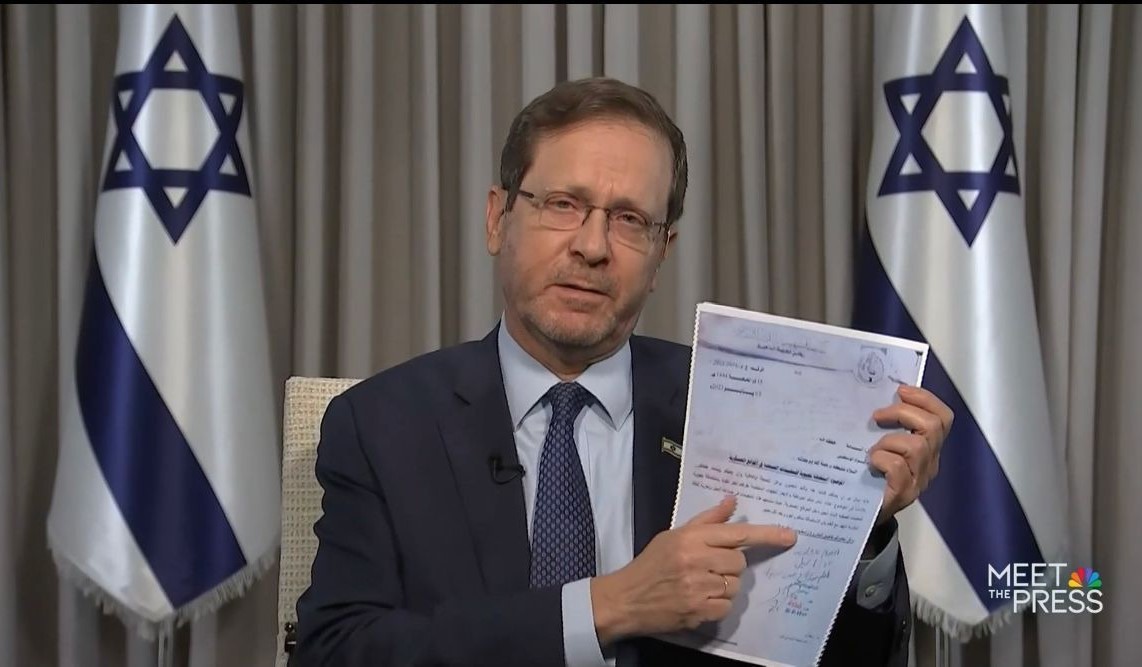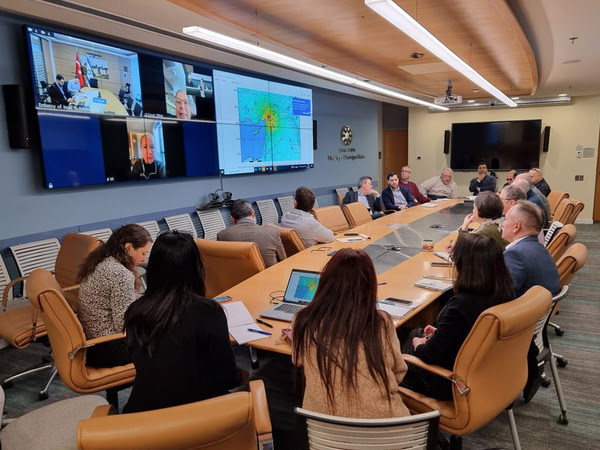
Honoring the Fallen: AACI Hosts Memorial Ceremony for Fallen IDF Soldiers and Victims of Terror from North America in Partnership with KKL-JNF
The Association of American and Canadian Immigrants (AACI), in collaboration with Keren Kayemeth LeIsrael-Jewish National Fund, solemnly conducted its annual memorial ceremony today to honor the fallen IDF soldiers and victims of terror who immigrated from North America. The moving event took place at the Sha'ar HaGai memorial site.

In attendance were members of bereaved families, U.S. Ambassador to Israel Jacob Lu, Jewish Agency Chairman Doron Almog, Director of Fundraising Department in KKL-JNF Michael Ben Abu, representative from the Canadian Embassy Michael Mancini, and esteemed guests.
The memorial site serves as a heartfelt tribute to over 400 fallen IDF soldiers and victims of terror from the United States and Canada, whose sacrifices began with the Battle of Tel Hai. This year, amidst the ongoing Iron Sword War, 77 additional names have been engraved onto the memorial wall, ensuring their enduring remembrance.
Photo Credit: Avi Hayun, KKL-JNF

Terrorist Summer Camps: In an interview with NBC’s Meet the Press, President Herzog reveals discovered Hamas document directing children’s summer camps on terror bases
Document calls camps “To advance the resistance culture and the values of Jihad… to contribute to the militarization of society,” with activities including terror attack simulations.
President Isaac Herzog revealed today, Sunday, in an interview with NBC’s Meet the Press, documentation discovered by IDF forces in Gaza detailing an action plan for Hamas terrorist camps to host and train children to be the terrorists of the next generation.
The document is further proof of how the terrorist organization Hamas works to establish its ideology in the Gaza Strip, among other things, by educating children to hate Jews, and promoting religious extremism, violence, and terrorism. Among its activities, Hamas runs a network of summer camps which include military camps throughout the Gaza Strip, in order to train the younger generation of Gaza's children to become the future generation of the organization's terrorists.
The document - written and issued in July 2023, by the Al Qasam Brigade military wing of Hamas – lays out a plan to host Hamas summer camps for children on the movement’s terrorist bases, with the goal “To advance the resistance culture and the values of Jihad, standing strong, and sacrifice within the children… to contribute to the militarization of society.”
According to the document, as part of the terror camp, the children were to be trained to shoot weapons, conduct simulations and study theoretical courses – with the stated aim of preparing the next generation in Gaza to serve in the terrorist organization.
In the interview with NBC’s Kristen Welker, President Herzog said, “This is not only a war between Israel and Hamas, it has to do with the values of the free world. Let me show you a document, a highly confidential, strictly confidential document, which we just unraveled from the Hamas headquarters. It's a brochure, which is a directive by the commanders of Hamas as to how to manage summer camps for children in order to disseminate the values of jihad. It says it clearly to disseminate the values of jihad, and the values of the resistance meaning terror, and how to make it a militarized society. And it's all over the Gaza Strip, meaning they take the kids - whilst we all know what summer camps are and what they're aimed for, and what a wonderful experience it is to enable youngsters, kids, and adolescents to become citizens of the free world and with liberty, with happiness with joy, with sports - here their entire aim is to make them terrorists.”



An initial rescue mission is expected to depart this evening (Monday, 6 February 2023). A larger delegation, which will include extensive humanitarian aid in cooperation with other aid agencies, is planned to depart tomorrow morning.
In a discussion held by Minister of Foreign Affairs Eli Cohen and MFA Director-General Ronen Levi. with the participation of senior MFA officials and representatives of the National Security Council (NSC), the IDF and the Ministries of Defense and Health, it was decided to advance the dispatch of two aid delegations to the disaster area in Turkey within the next few hours.
An initial rescue mission is expected to depart this evening (Monday, 6 February 2023). A larger delegation, which will include extensive humanitarian aid in cooperation with other aid agencies, is planned to depart tomorrow morning.
During the discussion, Israel’s Ambassador to Türkiye, Irit Lillian, and other security officials provided a comprehensive overview of the current situation in the area.
Minister of Foreign Affairs Eli Cohen: "We all participate in the sorrow of the Turkish people following tonight’s tragedy. I spoke earlier with my counterpart, the Turkish Foreign Minister, and expressed my deep sorrow. Today we are sending two professional delegations on behalf of the State of Israel, including representatives of the Ministry of Foreign Affairs, in order to do everything we can to aid the victims. Israel today stands alongside Türkiye in its difficult hour."
MFA Dir-Gen Ronen Levi: “This is a dramatic event, unfortunately we are used to such events. We must be prepared to take care of anyone who needs help. We must act as quickly as possible in order to save lives; the knowledge accumulated by MFA missions in the field is extremely important for the success of handling this incident."
Photo Emergency discussion in the MFA situation room . Photo: MFA.


The State of Israel is ranked last among OECD countries regarding implementation of food rescue policies
Leket Israel’s Food Waste and Rescue Report, produced in collaboration with Israel’s Ministry of Environmental Protection and Harvard Law School’s Food Law and Policy Clinic and written by BDO, reveals, for the first time, that the scope of food waste in Israel in 2021 is estimated at a value of approximately NIS 21.3 billion (US $6.1b) and consists of 37% of food production in Israel.
In a special chapter of the Report, an international comparison shows that Israel ranks last among the OECD countries in the number of policy tools it has implemented to eradicate the food loss crisis.
The 7th Annual Food Waste and Rescue Report, with the help of globally accepted measurement tools, examines the governmental steps in OECD countries to implement policy tools to reduce food waste. While the government ministries formulated various plans to reduce poverty and to minimize the social gaps, it appears that when it comes to food waste and rescue, this issue is not a priority.
According to the Report’s estimates, the extent of food loss in Israel in 2021 is 2.6 million tons (52 billion lbs.) valued at NIS 21.3 billion (US $6.1b) which consists of 37% of food production in Israel. Of this, 50% of the food is salvageable and is fit for human consumption, translating to over 1 million tons (2 billion lbs.) at a value of NIS 7.5 billion (US $2.14b).
A comparison with countries around the world reveals that the food waste crisis is not unique to the Israeli economy. However, among the 18 countries studied in the policy index supporting food rescue and food waste reduction, Israel has implemented the fewest number of policy tools to eradicate this phenomenon, ranking it last of the 18 countries measured.
Encouraging the implementation of food rescue policy tools is imperative. From an environmental perspective, it will enable optimal utilization of existing natural resources and the reduction of pollution and greenhouse gas emissions. Economically, food rescue is a proven alternative to food production; preventing waste of precious resources and saving the Israeli economy NIS 5 billion (US $1.43b) annually. Socially, food rescue contributes to reducing the poverty level in Israel and strengthens the vulnerable populations suffering from food insecurity. Rescuing just 20% of the food currently going to waste will close the entire food insecurity gap in Israel and cost only NIS 1.1 billion (US $314m).
Gidi Kroch, CEO – Leket Israel: “Israel’s position in last place in the implementation of policy tools to reduce food waste is not surprising but is cause for real concern. For the last six years, Leket Israel has published a comprehensive Food Waste and Rescue Report, signed by Israel’s Ministry of Environmental Protection, and supported by data from the Israeli Ministry of Agriculture and Rural Development, issuing warnings about the volumes of food which are thrown away each year. At a time when not just 20% of the country’s population is in need of assistance, but the entire world is facing a climate crisis, wars and pandemics that are undermining everything we knew about food reserves and food security, the time has come for a complete overhaul of priorities in Israel, coming directly from the Prime Minister’s Office with food rescue at the top of the list. The greatest advantage of food rescue is the ability to not only close the entire food insecurity gap in Israel by a quarter of the budget, but also greater utilization of natural resources and waste prevention. Additionally, food rescue helps reduce gas emissions and pollutants and strengthens the fight against the global climate crisis. It is incomprehensible that there is a solution that exists which would be effective across the board with economic, social, environmental and health benefits, and yet, the government ignores it with its indifference. We no longer have that privilege. The entire world is under real threat. The time to act is now, we need to take effective steps to reduce food waste and to preserve existing resources. Israel must come out of its indifference and immediately join the fight to reduce this crisis.”
Prof. Emily Broad Leib, Director, Food Law and Policy Clinic of the Center for Health Law and Policy Innovation: “In this year’s Food Waste and Rescue Report, through a collaboration between the Harvard Law School Food Law and Policy Clinic and Leket Israel, an international comparison of food waste and food rescue policies highlights the issue of food waste as a global concern, which is only exacerbated by the climate crisis. Israel remains far behind other OECD countries, however; with the tools presented in this Report, there is hope that Israel will be able to formulate a national plan to reduce food waste by 50% by 2030 and close the food insecurity gap in Israel.”
Chen Herzog, Chief Economist – BDO and Editor of the Report: “Israel ranking lowest among countries with food rescue policies, requires the new government, as part of the fight against the rising cost of living, to adopt a comprehensive food rescue policy. The cost of food waste comes out of the consumers pocket and greatly impacts the cost of living in Israel, causing an 11% rise in food prices. The increase in the cost of food due to the war in Ukraine further strengthens the economic viability of food rescue. Food rescue is an economic and socially advantageous solution to combating food waste. Every NIS 1 (US $.3) invested in food rescue contributes NIS 4.3 (US $1.22) to the national economy.
More than ever, this Report demonstrates the importance of adopting a food rescue program, as is customary in many countries around the world. The plan should include the 8 policy tools to encourage food rescue which are included in the Report’s findings.
Developing a plan to rescue and distribute surplus food is imperative as most of the average Israelis are spending the majority of their money on food. Additionally, it would save the national economy NIS 2.5 billion (US $714m) and NIS 4 billion (US $1.14b) if you include the social and environmental benefits.”
Tamar Zandberg, Minister of Environmental Protection: “This Report is published at a time when world leaders gather in Sharm El-Sheikh, Egypt, to discuss solutions to solve the climate crisis and related global issues, such as the food waste crisis. Food rescue and minimizing food waste are necessary actions that need to be taken to preserve Israel's environmental, social, and economic resilience. It is critical that the State of Israel bridge gaps to align with other OECD countries addressing the issue of food waste and rescue. And through a ministry-wide and sweeping government move, we will be able to meet the challenge."
About Leket Israel: Serving as Israel’s largest food rescue organization, in 2021, Leket Israel rescued 1.7 million cooked meals from IDF army bases, hotels catering companies, and restaurants and 25 thousand tons (55 million pounds) of agricultural produce. All this rescued food was redistributed to 223,000+ needy people weekly through Leket Israel’s network of 263 nonprofit agency partners throughout Israel. For more information, please visit: www.leket.org/en.








